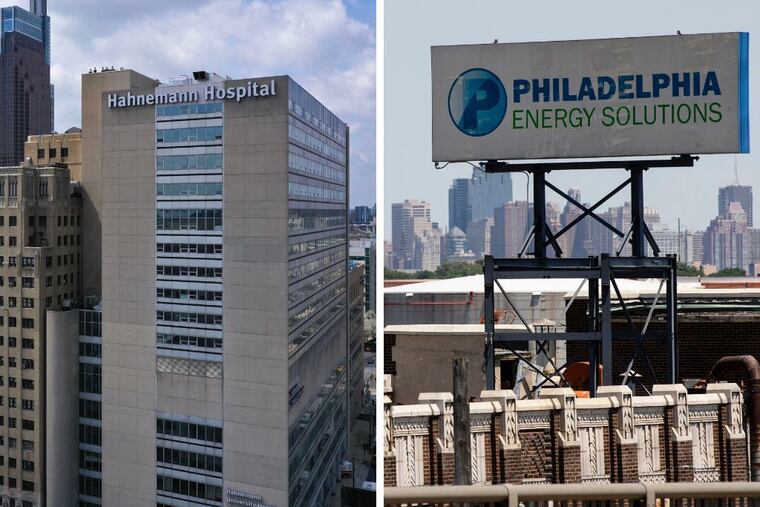Philadelphia is strong enough to overcome the closures of Hahnemann and the refinery. It has to be. | Editorial
Each of the 3,500 workers from Hahnemann and PES’ refinery deserves to hear directly from their elected officials that they are not alone.

About 3,500 workers in Philadelphia woke up Wednesday to the news that they will lose their jobs. After years of financial struggles, both Hahnemann University Hospital in Center City and Philadelphia Energy Solutions’ oil refinery in South Philly announced that they were closing.
On Thursday, the state ordered Hahnemann to cease and desist from the hospital’s closure until a plan for patient health and safety is in place. Refinery workers are still in the dark about the timeline of closure and their severance.
The closures raise questions about the future use of the sites and the supply of energy and health care in our city. These issues deserve attention that we will give in forthcoming weeks. Today, we focus on the immediate impact on jobs.
The city has been adding about 14,000 jobs a year on average over the last five years, according to the Federal Reserve Bank of Philadelphia. Assuming this positive job creation, the loss of Hahnemann and refinery jobs will reduce growth by 25 percent this year. Further, every contractor — from laundry to food services — that served these large institutions will lose business.
At least in the short term, these closures are devastating to individual workers. Losing income, health care, and being forced to dig into savings — if they have them — without any guarantee can lead to depression, anxiety, debt, personal bankruptcy. That is especially troubling in the midst of a crisis of overdose deaths and suicides.
But there is reason for hope. It is incumbent on our elected officials — from our mayor to the governor to our representatives in Congress — to convey that to impacted workers.
Philadelphia Works, the city’s workforce development board, is planning job fairs and is in conversations with employers that might be able to take in workers.
Hahnemann’s closure comes at a time when the health-care sector is expanding. The University of Pennsylvania Health System will soon complete construction on a pavilion that will add 700 beds to Penn Medicine — about 200 more beds than Hahnemann has. It is the civic duty of the city’s medical institutions to publicly commit to taking in Hahnemann workers and trainees — especially large nonprofits like Penn, Jefferson, and Temple that are exempt from paying property taxes.
If they won’t, elected officials of all levels should use their bully pulpit to pressure the “meds."
The bigger challenge is the refinery workers. According to the Fed, the average wage of a Pennsylvania refinery worker is about $107,000 a year. It’s unclear how transferable these highly specialized skills are to other jobs in the city. Some workers might be enticed to leave the region. For example, according to Philadelphia Works, a Tennessee refinery has expressed interest in hiring PES workers.
Each of the 3,500 workers from Hahnemann and PES’s refinery deserves to hear from elected officials that they are not alone. They also deserve regular updates about their prospects. Philadelphia is strong enough to weather this storm — and it is up to the mayor, governor, and other elected officials to convince all workers that their future is hope and stability, not despair.